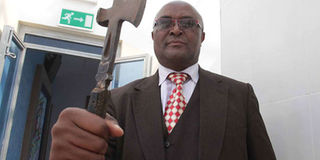Ex-army man recalls lead-up to1982 failed coup

Former soldier Douglas Karanja Wachira on July 31, 2019 displays the axe he and his colleagues used to break the fence at Eastleigh Airbase during the failed 1982 coup. They helped avert the coup. PHOTO | JOSEPH KANYI | NATION MEDIA GROUP
What you need to know:
- The graduate of Conflict and Disaster Management is also involved in peace and cohesion initiatives in the country.
Douglas Karanja Wachira was a 24-year-old budding soldier when a call came that he accompanies others to Eastleigh Airbase as there was a breach. It was barely dawn when the orders came.
A contingent of air force officers had planned to overthrow the government and instal one of their own as president.
Exactly 37 years later, Mr Wachira recalls the events of the chilly morning and he has to date an axe that changed the course of his life.
“On our way to the airbase, at Mlango Kubwa, we found shop looters and one of them was armed with a small axe. I managed to disarm him as we stopped the looters from breaking into the shops,” Mr Wachira recalls.
The improvised arm-axe, which he treasures, helped his battalion, which was under the command of Major Jackson Tuwei, to access the airbase through the tough chain-link fence.
POWER RESTORED
He still keeps the arm-axe as one of his most protected personal items at his home in Tetu, Nyeri County.
“The Ground Air Defence Unit (Gadu) manning the gate at Eastleigh fired towards us. We went back looking for another access. Were it not for the axe, accessing the airbase would have been an uphill mission. Breaking the fence with bare hands could have been impossible,” he says.
He reveres the arm-axe as one of the players who participated to restore President Daniel Moi’s government and remove the usurper, Hezekiah Ochuka.
Mr Wachira recalls that the attempts to overthrow President Moi started at 3am and he was attached to the Third Battalion in Lanet Barracks, Nakuru.
“Around 4am, Brigadier Msomba came directly to the residence of a commanding officer, which I was guarding. I was told to raise the fire alarm and all officers went to the assembly ground. We were told to immediately pick our firearms from the armoury,” he says.
OCHUKA FLEES
The officers were told that they were heading to the army headquarters in Nairobi, at the Department of Defence, where they would be issued further instructions.
Some military officers went to the Kenya Broadcasting Corporation (then known as Voice of Kenya) where Ochuka and his loyalists had captured the State broadcaster and announced that the military had overthrown the Moi government.
Ochuka was already back at the airbase and when Mr Wachira and other military officers arrived, he had escaped. Some of his lieutenants left at VoK were overpowered and neutralised.
“On entering the airbase, we were joined by officers from the B-Company and we arrested some officers who were supporting Ochuka’s mission. Ochuka flew to Tanzania after his rebels lacked support from other units of the military,” Mr Wachira says.
DEATH SENTENCE
Ochuka’s loyalists in Nanyuki and Nairobi were neither able to arrest President Moi and his Cabinet ministers nor seize control of other military barracks.
Ochuka was later extradited to Kenya where he was tried and found guilty of leading the coup attempt and sentenced to death. He was hanged in 1987.
Due to his involvement in restoring the government, Mr Wachira was promoted to Corporal but he retired in 1989 to engage in preaching the gospel.
“I went to a Bible college and became a pastor and founded the Prophet and Apostles Faith Church in 1992,” he says.
The graduate of Conflict and Disaster Management is also involved in peace and cohesion initiatives in the country.





